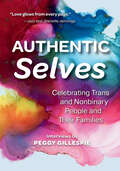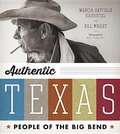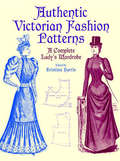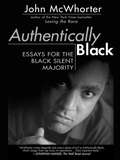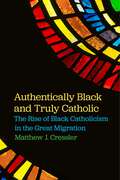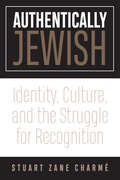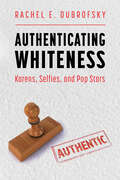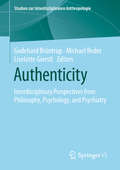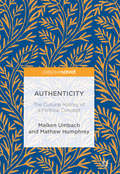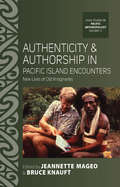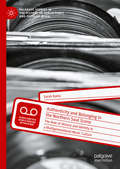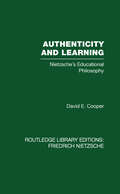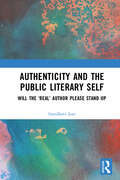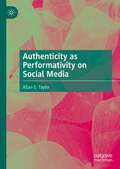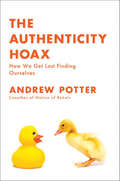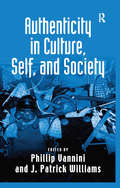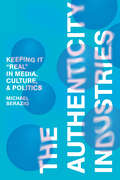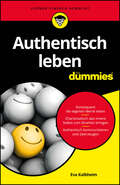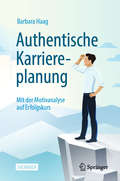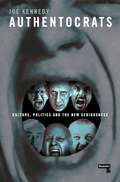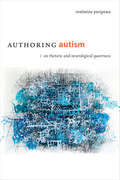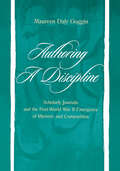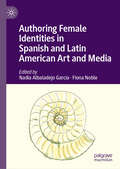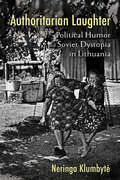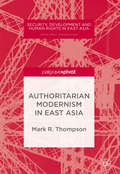- Table View
- List View
Authentic Selves: Celebrating Trans and Nonbinary People and Their Families
by Jeff MillerGroundbreaking in its depictions of joy and community, Authentic Selves celebrates trans and nonbinary people and their families in stunning photographs and their own words. Foreword by transgender activist Jazz Jennings and her mom and fellow activist, Jeanette Jennings.So often trans and nonbinary people’s stories are told only through the lens of their struggles and challenges, including their political battles for legal rights, but trans and nonbinary people live rich and fulfilling lives full of joy and community too. Authentic Selves: Celebrating Trans and Nonbinary People and Their Families is a sweeping compilation of life stories and portraits of trans and nonbinary people, as well as their partners, parents, children, siblings, and chosen family members.The compelling stories in Authentic Selves provide a glimpse into the real lives, both the challenges and the triumphs, of these remarkable people and their families, all of whom are working to create a more just, diverse, and compassionate world.Developed in collaboration with PFLAG National and Transgender Legal Defense & Education Fund.
Authentic Texas: People of the Big Bend
by Daudistel Marcia Hatfield Wright BillThe Texas of vast open spaces inhabited by independent, self-reliant men and women may be more of a dream than a reality for the state’s largely urban population, but it still exists in the Big Bend. One of the most sparsely settled areas of the United States, the Big Bend attracts people who are willing to forego many modern conveniences for a lifestyle that proclaims “don’t fence me in.” Marcia Hatfield Daudistel and Bill Wright believe that the character traits exemplified by folks in the Big Bend—including self-sufficiency, friendliness, and neighborliness—go back to the founding of the state. In this book, they introduce us to several dozen Big Bend residents—old and young, long-settled and recently arrived, racially diverse—who show us what it means to be an authentic Texan.
Authentic Victorian Fashion Patterns: A Complete Lady's Wardrobe
by Kristina HarrisRich selection of scaled dressmaker's patterns from the popular late 19th-century magazine The Voice of Fashion details 50 garments for women, from handsome daytime and evening dresses to casual tennis outfits, a riding habit, and undergarments. Of practical use for costume designers and students of fashion; will also delight browsers. 498 illustrations.
Authentically Black
by John McwhorterPicking up where the bestselling Losing the Raceleft off, this penetrating and profound collection of essays by the controversial thinker and passionate advocate for racial enlightenment and achievement explores what it means to be black in America today. According to the author, nearly forty years after the Civil Rights Act, African-Americans in this country still remain "a race apart. " He feels that modern black Americans have internalized a tacit message: "authentically black" people stress initiative in private but cloak the race in victimhood in public in order to protect black people from an ever-looming white backlash. He terms this the "New Double Consciousness" in homage to W. E. B. DuBois' description of a different kind of double consciousness in blacks a century ago. Within this context McWhorter takes the reader on a guided tour through the race issues dominant in our moment: racial profiling, getting past race, the reparations movement, black stereotypes in film and television, hip-hop, diversity, affirmative action, the word nigger, and Cornel West's resignation from Harvard. With his fierce intelligence and fervent eloquence, McWhorter makes a powerful case for the advancement of true racial equality. A timely and important work about issues that must be addressed by blacks and whites alike, Authentically Blackis a book for Americans of every racial, social, political, and economic persuasion.
Authentically Black and Truly Catholic: The Rise of Black Catholicism in the Great Migration
by Matthew J. CresslerExplores the contentious debates among Black Catholics about the proper relationship between religious practice and racial identity Chicago has been known as the Black Metropolis. But before the Great Migration, Chicago could have been called the Catholic Metropolis, with its skyline defined by parish spires as well as by industrial smoke stacks and skyscrapers. This book uncovers the intersection of the two. Authentically Black and Truly Catholic traces the developments within the church in Chicago to show how Black Catholic activists in the 1960s and 1970s made Black Catholicism as we know it today. The sweep of the Great Migration brought many Black migrants face-to-face with white missionaries for the first time and transformed the religious landscape of the urban North. The hopes migrants had for their new home met with the desires of missionaries to convert entire neighborhoods. Missionaries and migrants forged fraught relationships with one another and tens of thousands of Black men and women became Catholic in the middle decades of the twentieth century as a result. These Black Catholic converts saved failing parishes by embracing relationships and ritual life that distinguished them from the evangelical churches proliferating around them. They praised the “quiet dignity” of the Latin Mass, while distancing themselves from the gospel choirs, altar calls, and shouts of “amen!” increasingly common in Black evangelical churches. Their unique rituals and relationships came under intense scrutiny in the late 1960s, when a growing group of Black Catholic activists sparked a revolution in U.S. Catholicism. Inspired by both Black Power and Vatican II, they fought for the self-determination of Black parishes and the right to identify as both Black and Catholic. Faced with strong opposition from fellow Black Catholics, activists became missionaries of a sort as they sought to convert their coreligionists to a distinctively Black Catholicism. This book brings to light the complexities of these debates in what became one of the most significant Black Catholic communities in the country, changing the way we view the history of American Catholicism.
Authentically Jewish: Identity, Culture, and the Struggle for Recognition
by Stuart Z. CharméThis book analyzes the different conceptions of authenticity that are behind conflicts over who and what should be recognized as authentically Jewish. Although the concept of authenticity has been around for several centuries, it became a central focus for Jews since existentialist Jean-Paul Sartre raised the question in the 1940s. Building on the work of Sartre, later Jewish thinkers, philosophers, anthropologists, and cultural theorists, the book offers a model of Jewish authenticity that seeks to balance history and tradition, creative freedom and innovation, and the importance of recognition among different groups within an increasingly multicultural Jewish community. Author Stuart Z. Charmé explores how debates over authenticity and struggles for recognition are a key to understanding a wide range of controversies between Orthodox and liberal Jews, Zionist and diaspora Jews, white Jews and Jews of color, as well as the status of intermarried and messianic Jews, and the impact of Jewish genetics. In addition, it discusses how and when various cultural practices and traditions such as klezmer music, Israeli folk dance, Jewish yoga and meditation, and others are recognized as authentically Jewish, or not.
Authenticating Whiteness: Karens, Selfies, and Pop Stars (Race, Rhetoric, and Media Series)
by Rachel E. DubrofskyIn Authenticating Whiteness: Karens, Selfies, and Pop Stars, Rachel E. Dubrofsky explores the idea that popular media implicitly portrays whiteness as credible, trustworthy, familiar, and honest, and that this portrayal is normalized and ubiquitous. Whether on television, film, social media, or in the news, white people are constructed as believable and unrehearsed, from the way they talk to how they look and act.Dubrofsky argues that this way of making white people appear authentic is a strategy of whiteness, requiring attentiveness to the context of white supremacy in which the presentations unfold. The volume details how ideas about what is natural, good, and wholesome are reified in media, showing how these values are implicitly racialized. Additionally, the project details how white women are presented as particularly authentic when they seem to lose agency by expressing affect through emotional and bodily displays. The chapters examine a range of popular media—newspaper articles about Donald J. Trump, a selfie taken at Auschwitz, music videos by Miley Cyrus, the television series UnREAL, the infamous video of Amy Cooper calling the police on an innocent Black man, and the documentary Miss Americana—pinpointing patterns that cut across media to explore the implications for the larger culture in which they exist. At its heart, the book asks: Who gets to be authentic? And what are the implications?
Authenticity: Interdisciplinary Perspectives from Philosophy, Psychology, and Psychiatry (Studien zur Interdisziplinären Anthropologie)
by Godehard Brüntrup Michael Reder Liselotte GierstlToday, authenticity is considered an essential part of manifold interpersonal relationships, actions, and agreements. Authenticity’s association with sincerity, honesty, and reliability not only normatively charges the term in the context of social coexistence, but also makes it a demand which we impose on ourselves: The success of our lives is measured decisively by whether we live in harmony with our own convictions, wishes and needs. In philosophy, authenticity has also become the focus of interest, both in the context of the mechanisms of self-knowledge, as well as of personal development.The anthology aims to expand the cooperation across disciplines, in order to develop a comprehensive and profound understanding of authenticity, not by over-simplifying the highly complex subject, but by approaching the underlying concept from different scientific perspectives.
Authenticity: The Cultural History of a Political Concept
by Maiken Umbach Mathew HumphreyAuthenticity is everywhere: political leaders invoke the idea to gain our support, advertisers use it to sell their products. But is authenticity a dangerous hoax? What is, and is not, authentic has been hotly debated ever since the concept was invented. Many academics have sought to "unmask" authenticity claims as deceptive. This book takes a different approach. In chapters covering historical and contemporary examples, the authors explore why authenticity, real or imagined, exercises such a powerful hold on our imaginations. The chapters trace how invocations of authenticity borrow from one another, across arenas such as philosophy and theology, encounters with nature, leisure, and mass consumption, political and corporate leadership, left-wing and right-wing ideologies. This cultural history of authenticity is of interest to academic and lay readers alike, who are interested in the significance and history of a concept that shapes how we understand ourselves and the world we live in.
Authenticity and Authorship in Pacific Island Encounters: New Lives of Old Imaginaries (ASAO Studies in Pacific Anthropology #11)
by Bruce Knauft Jeannette MageoThe insular Pacific is a region saturated with great cultural diversity and poignant memories of colonial and Christian intrusion. Considering authenticity and authorship in the area, this book looks at how these ideas have manifested themselves in Pacific peoples and cultures. Through six rich complementary case studies, a theoretical introduction, and a critical afterword, this volume explores authenticity and authorship as “traveling concepts.” The book reveals diverse and surprising outcomes which shed light on how Pacific identity has changed from the past to the present.
Authenticity and Belonging in the Northern Soul Scene: The Role of History and Identity in a Multigenerational Music Culture (Palgrave Studies in the History of Subcultures and Popular Music)
by Sarah RaineThis book, which builds on a three-year immersive ethnographic study, argues that what scene participants do and say within the northern soul scene constitutes a claim to belong. For younger members, making claims to belong is problematic in a scene where dominant notions of authenticity held by insiders are rooted in a particular past: the places, people, events, and soundscapes of particular venues during the 1970s. In order to engage with this past, young men and women participate in a range of discursive practices. This book argues that these practices, and the ways they intersect and deviate from dominant notions of authenticity, represent shared and individual negotiations of the 'true soulie'. In doing so, it reveals the rich experiences of the younger generation of this multigenerational music scene, and the ways they establish a claim to belong to a scene first formed before they were born.
Authenticity and Learning: Nietzsche's Educational Philosophy (Rouledge Library Editions: Friedrich Nietzsche)
by David CooperDavid E. Cooper elucidates Nietzsche's educational views in detail, in a form that will be of value to educationalists as well as philosophers. In this title, first published in 1983, he shows how these views relate to the rest of Nietzsche's work, and to modern European and Anglo-Saxon philosophical concerns. For Nietzsche, the purpose of true education was to produce creative individuals who take responsibility for their lives, beliefs and values. His ideal was human authenticity. David E. Cooper sets Nietzsche's critique against the background of nineteenth-century German culture, yet is concerned at the same time to emphasize its bearing upon recent educational thought and policy.
Authenticity and the Public Literary Self: Will The ‘Real’ Author Please Stand Up
by Sreedhevi IyerThis is the first book-length study on how authors of color present themselves in public literary discourse. The study utilizes data obtained from and around exemplary empirical case study participants – Junot Diaz, Madeleine Thien, and Mohsin Hamid. Relevant data includes the case study authors’ Twitter usage and the impact of the digital sphere in author self-presentation. Dr Iyer employs a combined theoretical framework of discourse analysis and interactional sociolinguistics, with an awareness of literary and creative writing studies. The theoretical approach uses four metapragmatic stereotypes regarding what constitutes an ‘authentic’ author. The theoretical approach and metapragmatic stereotype form an evaluative framework that can be applied on diverse data to replicate findings.The study originated from the author’s own exposure to prevailing literary discourse through public engagements as a writer. She became aware of the problematic nature of an author’s public self-presentation, with a requirement to ‘be yourself’. Each celebrity author of color faces a paradoxical positioning within literary discourse as a result of that requirement. Through her study, Dr Iyer sought to discover how authors of color negotiate themselves in public spheres, including digital social media platforms, in order to accomplish ‘authenticity’ discursively.This book is ideal for learners and practitioners in creative writing who are seeking strategies for self-presentation as published authors. It is also valuable for researchers in discourse analysis, including literary discourse and social media discourse, providing an empirical means of evaluating ‘authenticity’ as understood in contemporary times.
Authenticity as Performativity on Social Media
by Allan S. TaylorAuthenticity is a highly-prized concept on social media, but given the history of the term, has it been adequately scrutinised? This book provides an alternative definition of authentic social media practice and suggests that, rather than being an achievable ideal, authenticity reveals itself as an unrepeatable temporary interval. Applying a post-structural lens of performativity, Taylor analyses the resurgence of the authentic as a cultural trend and argues that the professionalisation of social media has given rise to a ‘neoliberal authentic’ that equates productivity with self-actualisation, questioning whether society should present this as a cultural ideal. Using a new critical framework, Taylor recontextualises authenticity in a variety of social media practices. This includes authentic self-representation, authentic influence and its effect in influencer culture, as well as meme production as an attempt to find authenticity. Part-reader, part-manifesto, the book asks readers to reappraise authenticity and provides a working definition for future practice.
The Authenticity Hoax: How We Get Lost Finding Ourselves
by Andrew PotterExploring a number of trends in our popular culture, Andrew Potter argues that our pursuit of the authentic is fraught with irony and self-defeat.Thought provoking and revelatory, The Authenticity Hoax exposes how the search for the “true” and “real” is rooted in a society obsessed with individual elitists suckered into believing that their lifestyles are the only genuine ones in a fake world. Manipulated by the inescapable consumerism and sound bites of contemporary life, influenced ethically and politically, people embrace an artificiality borne of mass culture that alienates relationships and communities.In this no holds barred critique of modernism, Andrew Potter also shares how we stop worrying about being “authentic” and learn how to find peace and meaning with our current world, the people around us, and ourselves.“A totally real, genuine, authentic book about why you shouldn’t believe any of those words. And it’s genuinely good.” —New York Times bestselling author Gregg Easterbrook“It’s a fascinating approach to a fascinating subject, and Potter bolsters his argument with examples drawn from pop culture, history, and other sources. Written in a lively style that invites the reader to argue with the author, the book, at the very least, will turn the reader’s eye inward, and make us take a good, long look at the way we present ourselves to the world.” —Booklist“Potter’s lively cultural analysis combines an astute analysis of foundational antimodernist thought (in particular Rousseau) with savvy surveys of mass culture to flag the pitfalls and ironies of the modern obsession with authenticity in its every incarnation (authentically punk, spiritual, environmentally conscious) from our jeans to our celebrities.” —Publishers Weekly
Authenticity in Culture, Self, and Society
by J. Patrick WilliamsAcross sociology and cultural studies in particular, the concept of authenticity has begun to occupy a central role, yet in spite of its popularity as an ideal and philosophical value authenticity notably suffers from a certain vagueness, with work in this area tending to borrow ideas from outside of sociology, whilst failing to present empirical studies which centre on the concept itself. Authenticity in Culture, Self, and Society addresses the problems surrounding this concept, offering a sociological analysis of it for the first time in order to provide readers in the social and cultural sciences with a clear conceptualization of authenticity and with a survey of original empirical studies focused on its experience, negotiation, and social relevance at the levels of self, culture and specific social settings.
The Authenticity Industries: Keeping it "Real" in Media, Culture, and Politics
by Michael SerazioIn recent decades, authenticity has become an American obsession. It animates thirty years' worth of reality TV programming and fuels the explosive virality of one hot social media app after another. It characterizes Donald Trump's willful disregard for political correctness (and proofreading) and inspires multinational corporations to stake activist claims in ways that few "woke" brands ever dared before. It buttresses a multibillion-dollar influencer industry of everyday folks shilling their friends with #spon-con and burnishes the street cred of rock stars and rappers alike. But, ironically, authenticity's not actually real: it's as fabricated as it is ubiquitous. In The Authenticity Industries, journalist and scholar Michael Serazio combines eye-opening reporting and lively prose to take readers behind the scenes with those who make "reality"—and the ways it tries to influence us. Drawing upon dozens of rare interviews with campaign consultants, advertising executives, tech company leadership, and entertainment industry gatekeepers, the book slyly investigates the professionals and practices that make people, products, and platforms seem "authentic" in today's media, culture, and politics. The result is a spotlight on the power of authenticity in today's media-saturated world and the strategies to satisfy this widespread yearning. In theory, authenticity might represent the central moral framework of our time: allaying anxieties about self and society, culture and commerce, and technology and humanity. It infects and informs our ideals of celebrity, aesthetics, privacy, nostalgia, and populism. And Serazio reveals how these pretenses are crafted, backstage, for audiences, consumers, and voters.
Authentisch leben für Dummies (Für Dummies)
by Eva KalbheimEins mit sich selbst Original oder Kopie, selbst- oder fremdbestimmt, wahrhaftig oder angepasst? Wie wollen Sie leben? Und wie haben Sie bisher gelebt? Stellen Sie sich vor, Sie wären eins mit sich selbst, bräuchten keine Eigenheiten, Wünsche oder Bedürfnisse zu verstecken, könnten Ihr Potenzial voll ausleben, Ihre Meinung sagen und konsequent Ihren Werten folgen: Wie würden Sie sich fühlen? Was könnten Sie erreichen und verwirklichen? Dieses Buch hilft Ihnen dabei, sich selbst neu zu entdecken, Ihre Persönlichkeit zu entfalten und Ihren eigenen Weg zu finden und zu gehen. Sie erfahren Wie Sie Beziehungen authentisch leben Wie Sie sich beruflich unverwechselbar positionieren Wie Sie charismatisch kommunizieren Wie Sie Ihr Selbst zum Strahlen bringen.
Authentische Karriereplanung: Mit der Motivanalyse auf Erfolgskurs
by Barbara HaagFür den eigenen Beruf brennen statt auszubrennen – das liegt in Ihrer Hand, denn Motivation ist machbar: Sie stellt sich ein, wenn eine hohe Übereinstimmung zwischen dem persönlichen Motivtyp und dem beruflichen Anforderungsprofil besteht. Mit diesem Buch finden auch Sie heraus, welches der fünf Motive Leistung, Freundschaft, Autonomie, Wettbewerb und Vision bzw. welche Motivkombination Sie antreibt und wie Sie dieses Wissen ganz konkret für mehr Elan, Freude und Erfolg im Beruf nutzen können. Die überarbeitete und aktualisierte 2. Auflage wurde unter anderem um die Themen „Herausforderungen im Change“ und „Persönlichkeitsentwicklung“ ergänzt. Ein unverzichtbarer, psychologisch fundierter Motivations- und Karriereratgeber mit zahlreichen Tipps aus der beruflichen Praxis!
Authentocrats: Culture, Politics and the New Seriousness
by Joe Kennedy"The Authentocrats" claim to the be the new voice of common sense that speak for the common man and woman; right-wing, traditional and dangerous, Joe Kennedy argues that they are everything but what they purport to be.In contemporary Britain, a lot has been said about what it is that “real people” want politically. Forgotten by elites and sick of globalisation, so the story goes, they demand patriotism, respect for the military, assurances on defence, and controls on immigration. In trying to meet these supposed wishes, politicians attempt to appear normal, salt-of-the-earth, authentic. Authentocrats examines the function of this “authenticity” in a centrist politics which, paradoxically, often defines itself as cosmopolitan, technocratic and opposed to populism. Casting a doubtful eye over – amongst other things – latter-day James Bond films, contemporary nature writing and stand-up comedy, Authentocrats suggests that the sooner we can break with the sententiousness of a skewed conception of authenticity in aesthetics and politics the better.
Authoring Autism: On Rhetoric and Neurological Queerness
by Melanie YergeauIn Authoring Autism Melanie Yergeau defines neurodivergence as an identity—neuroqueerness—rather than an impairment. Using a queer theory framework, Yergeau notes the stereotypes that deny autistic people their humanity and the chance to define themselves while also challenging cognitive studies scholarship and its reification of the neurological passivity of autistics. She also critiques early intensive behavioral interventions—which have much in common with gay conversion therapy—and questions the ableist privileging of intentionality and diplomacy in rhetorical traditions. Using storying as her method, she presents an alternative view of autistic rhetoricity by foregrounding the cunning rhetorical abilities of autistics and by framing autism as a narrative condition wherein autistics are the best-equipped people to define their experience. Contending that autism represents a queer way of being that simultaneously embraces and rejects the rhetorical, Yergeau shows how autistic people queer the lines of rhetoric, humanity, and agency. In so doing, she demonstrates how an autistic rhetoric requires the reconceptualization of rhetoric’s very essence.
Authoring A Discipline: Scholarly Journals and the Post-world War Ii Emergence of Rhetoric and Composition
by Maureen Daly GogginAuthoring a Discipline traces the post-World War II emergence of rhetoric and composition as a discipline within departments of English in institutions of higher education in the United States. Goggin brings to light both the evolution of this discipline and many of the key individuals involved in its development. Drawing on archival and oral evidence, this history offers a comprehensive and systematic investigation of scholarly journals, the editors who directed them, and the authors who contributed to them, demonstrating the influence that publications and participants have had in the emergence of rhetoric and composition as an independent field of study. Goggin considers the complex struggles in which scholars and teachers engaged to stake ground and to construct a professional and disciplinary identity. She identifies major debates and controversies that ignited as the discipline emerged and analyzes how the editors and contributors to the major scholarly journals helped to shape, and in turn were shaped by, the field of rhetoric and composition. She also coins a new term--discipliniographer--to describe those who write the field through authoring and authorizing work, thus creating the social and political contexts in which the discipline emerged. The research presented here demonstrates clearly how disciplines are social products, born of political struggles for both intellectual and material spaces.
Authoring Female Identities in Spanish and Latin American Art and Media
by Nadia Albaladejo García Fiona NobleThis edited volume places the work of Spanish and Latin American female artists in, between, and across genres, media, spaces, identities, disciplines, and worlds. Its aim is to curate a series of interconnected studies on women artists across diverse media, and to position and redefine our understanding of female authorship. This is a timely intervention both in and beyond the fields of Hispanic Studies and Film and Cultural Studies, given the continued lack of visibility and persistent inequities experienced by individuals who identify as women.
Authoritarian Laughter: Political Humor and Soviet Dystopia in Lithuania
by Neringa KlumbytėAuthoritarian Laughter explores the political history of the satire and humor magazine Broom published in Soviet Lithuania. Artists, writers, and journalists were required to create state-sponsored Soviet humor and serve the Communist Party after Lithuania was incorporated into the Soviet Union in 1940. Neringa Klumbytė investigates official attempts to shape citizens into Soviet subjects and engage them through a culture of popular humor. Broom was multidirectional—it both facilitated Communist Party agendas and expressed opposition toward the Soviet regime. Official satire and humor in Soviet Lithuania increasingly created dystopian visions of Soviet modernity and were a forum for critical ideas and nationalist sentiments that were mobilized in anti-Soviet revolutionary laughter in the late 1980s and early 1990s. Authoritarian Laughter illustrates that Soviet Western peripheries were unstable and their governance was limited. While authoritarian states engage in a statecraft of the everyday and seek to engineer intimate lives, authoritarianism is defied not only in revolutions, but in the many stories people tell each other about themselves in jokes, cartoons, and satires.
Authoritarian Modernism in East Asia (Security, Development and Human Rights in East Asia)
by Mark R. ThompsonFollowing Barrington Moore Jr., this book raises doubts about modernization theory’s claim that an advanced economy with extensive social differentiation is incompatible with authoritarian rule. Authoritarian modernism in East Asia (Northeast and Southeast Asia) has been characterized by economically reformist but politically conservative leaders who have attempted to learn the “secrets” of authoritarian rule in modern society. They demobilize civil society while endeavoring to establish an “ethical” form of rule and claim reactionary culturalist legitimation. With China, East Asia is home to the most important country in the world today that is rapidly modernizing while attempting to remain authoritarian.
